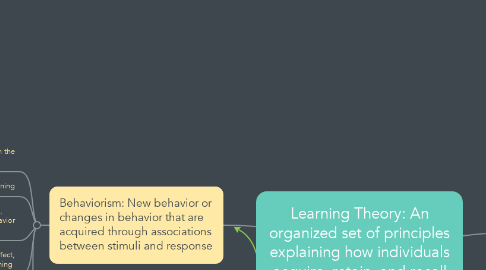Learning Theory: An organized set of principles explaining how individuals acquire, retain, and recall knowledge
by Shawna Williams

1. Cognitivism: Learning that occurs through internal process
1.1. Marriner David Merill: The Compact Theory, Instructional Transaction Theory, The First Principle of Instruction
1.2. Robert Mills Gagne: Conditions of Learning
1.3. Jerome Bruner: Several books on cognitive psychology, educational psychology, and language development
1.4. Charles Reigeluth: Instructional Deign Theories and Models
1.5. Roger Schank: Conceptual dependency theory and case-based reasoning
2. Behaviorism: New behavior or changes in behavior that are acquired through associations between stimuli and response
2.1. John B. Watson: Psychology from the standpoint of a behaviorist
2.2. Ivan Pavlov: Classical Conditioning
2.3. B.F Skinner: Operant Conditioning, Radical Behaviorism, Applied Behavior analysis, Verbal behavior
2.4. E.L Thorndike: The law of effect, trial-and-error theory of learning
2.5. Albert Bandura: Observational Theory, Social Learning Theory
3. Constructivism: We construct our own knowledge of the world based on an individual experiences
3.1. Jean Piaget: Recongnised as the founder of constructivism. He founded the International Centre of Genetic Epistemology at Genevea in 1995 and became it's direction. He made extraordinary contributions in various areas, including sociology, experimental psychology and scientific thought.
3.2. Lev Semyonovich Vygotsky: Best known for his sociocultural theory. He believed that social interaction plays a critical role in children's learning.
3.3. Jerome Seymour Bruner: Books on constructive psychology, educational psychology, and language development.
3.4. John Dewey: Helped found pragmatism, a philosophical school of thought that was popular at the beginning of the 20th century. He was also instrumental in the progressive movement in education, strongly believing that the best education involves learning through doing.
3.5. Ernst von Glasersfeld: Is one of the leading advocates of a radical version of constructivism both as a theory of knowledge and as a guide for science education.


